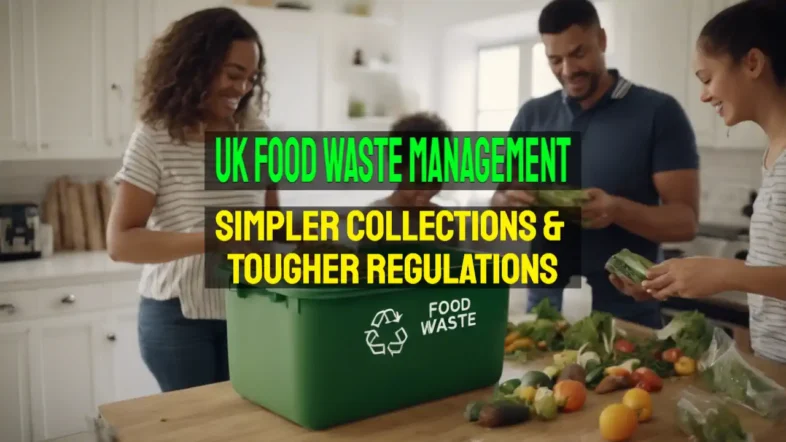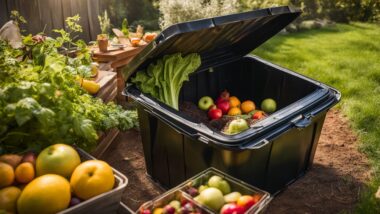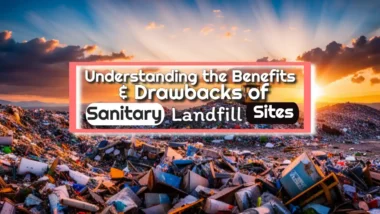The future of UK food waste management will be a big push toward higher recycling rates through simpler collection and far greater consistency across the nations, helping citizens understand how to be green and recycle more organic waste.
As the UK continues to advance its environmental goals, recently announced government policies aimed at simplifying waste collections and toughening regulations to improve recycling are poised to transform the landscape of food waste management.
As part of the Simpler Recycling policy, those English councils not yet providing a separate food waste collection must gear up to introduce weekly food waste pickups by March 31, 2026. To fund this, Defra has recently announced that it will provide £295 million in cash to local councils to help them implement these collections.
The full details of the new requirements were released at the start of April this year (2024), meaning that local authorities are being asked to very rapidly introduce sweeping changes. Changes that, for some, will require a complete reorganization of existing waste management contracts. Long-term contracts will need changing with the “big 5″ waste management companies that, amongst themselves, provide the UK’s street collection services.
These initiatives reflect a strategic alignment with the waste hierarchy, which prioritizes waste prevention, reuse, recycling, and recovery while relegating disposal to the last resort.
Current State of Food Waste Management in the UK
Annually, the UK generates approximately 10 million metric tons of food waste, with varying degrees of recycling and recovery (Source: circularonline.co.uk, Circular. Magazine, Jan 2022):
- Households: 7.1 million tonnes (70%)
- Food manufacturing: 1.9 million tonnes (18%)
- Hospitality and food-service sector: 1 million tonnes (10%)
- Retail and wholesale sector: 0.3 million tonnes (2.5%)
Despite these figures, only 51% of local authorities in England provide dedicated food waste collection services, highlighting a significant gap in the country’s food waste management system.
By contrast, the Scottish and Welsh governments already substantially comply with the new requirements to collect food waste separately. For them, smaller changes will be needed if they decide to align with the new English “simpler collections” philosophy.
Government Initiatives and Policy Changes
Enhancing Recycling and Reducing Waste in Light of UK Government Policies
In a significant shift towards sustainability, the UK Government has unveiled comprehensive reforms aimed at overhauling household and business waste management systems. This means that food waste recycling rates in England should now rise close to Welsh and Scottish levels.
These reforms, which the Department for Environment, Food, and Rural Affairs first announced on October 21, 2023, aim to increase recycling rates and ensure environmental protection through easier recycling collections and strict regulations that target dishonest waste carriers.
Government’s New Strategy for Simplified Recycling
The government’s new approach introduces a uniform recycling protocol across England, simplifying the recycling process by standardizing the materials that can be recycled regardless of location—be it at home, work, or school. This initiative promises to alleviate confusion and enhance recycling compliance by making recycling practices consistent nationwide.

Key Components of the Reform:
-
- By March 2026, weekly nationwide food waste collections must be in place to stop the buildup of biodegradable waste and to reduce associated odours and hygiene problems.
- A unified collection system for recyclables such as glass, metal, plastic, paper and card, which facilitates easier sorting and higher quality recycling output.
- Reduction in the number of bins each household needs to manage, aiming to streamline waste management and maintain cleanliness and order at the street level.
Environmental and Economic Benefits
These reforms are not just about improving waste management but are also designed to foster environmental sustainability by reducing landfill use and lowering greenhouse gas emissions. The push towards regular food waste collection is particularly notable as it targets methane emissions from decomposing organic waste—a potent contributor to climate change.
Impact on the Recycling Industry
By ensuring that all packaging is universally recyclable, the reforms support the UK recycling sector’s growth by increasing the supply of recyclable materials and fostering innovation in sustainable packaging solutions.
Stakeholder Reactions
Key figures in the waste management and environmental sectors have expressed strong support for the government’s plan.
From industry councils to environmental groups, the consensus is that these changes will simplify recycling practices and significantly enhance public participation in sustainable waste management.
Voices from the Industry:
In a Press Release in October 2023, DEFRA stated that:
-
- Paul Vanston, CEO of the Industry Council for Packaging and the Environment, highlighted the public’s overwhelming support for clear recycling instructions.
- Claire Shrewsbury, Director of Insights and Innovation at WRAP, applauded the inclusion of essential materials and universal food waste collections, emphasizing its potential to streamline operations and boost efficiency across local authorities and businesses.
Challenges and Future Directions
While the reforms are promising, they also present challenges, particularly in terms of implementation across diverse communities and ensuring compliance. Additionally, there is the task of adequately preparing waste management infrastructures to handle an anticipated increase in recyclable material throughput.
Anticipated Adjustments:
-
- Local authorities may need to invest in new technologies and staff training to effectively manage the more frequent collections and a broader range of recyclable materials.
- Businesses, especially in the hospitality and retail sectors, will need to adjust their operations to align with the new waste management protocols, which could involve initial logistical and financial challenges.
The Role of Composting and Anaerobic Digestion
Composting and anaerobic digestion (AD) stand as the cornerstone technologies for processing organic waste in the UK:
-
-
- Composting transforms organic waste into valuable soil amendments through aerobic decomposition.
- Anaerobic digestion breaks down organic material in an oxygen-free environment, producing biogas and digestate, both of which can be utilized further.
-
Summarizing
The UK Government’s bold steps towards reforming waste management practices mark a pivotal advancement in the country’s environmental policy.
By making recycling simpler and more consistent, these changes are expected to significantly enhance recycling rates, reduce waste, and contribute to a more sustainable future.
As these policies are implemented, ongoing engagement with stakeholders and the public will be crucial in refining and optimizing the approaches to achieve the desired environmental outcomes.
For a deeper read into how these changes will reshape the landscape of waste management and recycling for local authorities, and to explore further discussions on the topic, please visit our detailed blog post on this subject.
Impacts of New Policies on Organic Recycling Infrastructure
The existing infrastructure currently includes:
- 400 active composting sites, with 272 in England
- 50 in-vessel composting (IVC) facilities capable of handling animal by-products
These facilities are instrumental in managing the increasing volumes of food waste, expected to rise sharply as new collection policies take effect.
For the first time, all businesses will be required to recycle their food waste and do it under the new Simpler Recycling rules.
Approximately an additional 1.4 million tonnes of food waste annually will be diverted from landfill, but only if suitable facilities are available for the processing of this additional organic waste.
Technological Innovations and Future Directions
Technological advancements are critical to enhancing the efficiency of food waste processing. Innovations in de-packaging technologies, for instance, ensure that organic waste is free of contaminants before undergoing anaerobic digestion, thereby improving the quality of the output and the efficiency of the process.
Challenges and Regulatory Impacts
New regulations aimed at reducing emissions and tightening quality standards for compost and digestate pose challenges to the organic recycling industry, potentially increasing operational costs and complexity.
Conclusion
UK government policies are set to dramatically reshape the framework of food waste management, driving innovation and compliance in the sector. Stakeholders are encouraged to adapt and innovate in response to these evolving requirements.
For a more detailed exploration of thermal treatments and their impact on waste management, please read our detailed article.
UK Food Waste Management FAQs
What is the waste hierarchy?
The waste hierarchy is a guideline for managing waste, prioritizing prevention, reuse, recycling, and recovery, with disposal as the last option.
How does anaerobic digestion contribute to waste management?
Anaerobic digestion helps convert organic waste into biogas and digestate, reducing landfill use and producing renewable energy and valuable soil amendments.
What changes are being made to the UK’s recycling collections?
The UK government is standardizing recycling processes across the nation, introducing weekly food waste collections, and reducing the number of bins required per household to streamline and enhance recycling efforts.
How will the new recycling reforms affect households?
Households across England will experience more frequent food waste collections and will only need to sort their waste into fewer categories, making the recycling process simpler and more efficient.
Cost of Commercial Waste Disposal UK: Keeping the Numbers Low: What UK Rubbish Really Costs
Managing rubbish costs money. UK companies know this too well, as they deal with heaps of trash every day. Every year, these businesses create 27.5 million tonnes of commercial waste and 13.6 million tonnes of industrial waste – that’s a mountain weighing 41.1 million tonnes! Tossing all that waste can eat up to 4-5% of […]
The Ultimate Guide To Recycling Plasterboard: How To Dispose Of Plasterboard Waste Properly
Plasterboard is a popular building material used in homes and offices. It’s light, strong, and easy to work with. But when it turns into waste, we can’t just throw it away like old food wrappers. Rules say plasterboard must not mix with other trash because it can harm the environment. Luckily, clean plasterboard can go […]
Unfashionable Talk About Landfills
Get ready for unfashionable talk about landfills! Let’s talk rubbish—literally. You might not think about landfills much unless the smell drifts your way on a windy day or you’re tossing out the garbage. But these dumping grounds are more than just piles of junk; they’re a snapshot of our consumer habits and a challenge we need to tackle. Landfill […]
Can You Take Plaster to the Tip? Guidelines and Restrictions for Disposing of Plaster and Plasterboard Waste
Plaster and plasterboard are common in building and fixing up homes. These materials can’t just be thrown out like regular rubbish. Some recycling places take them, but you need to know the rules first. Plasterboard should not go to a landfill as it’s against the law due to environmental concerns. Also, some dangers come with […]









